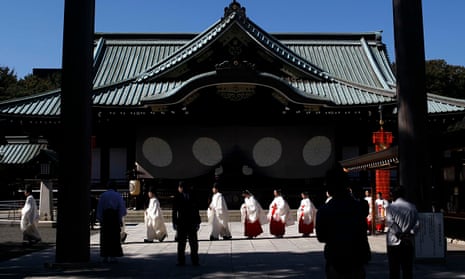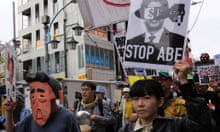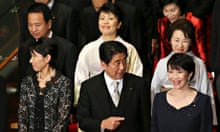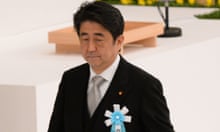China’s foreign ministry has expressed serious concern after the Japanese prime minister, Shinzo Abe, sent a ritual offering to Tokyo’s Yasukuni shrine, where war criminals are honoured among 2.5 million casualties from the second world war.
Dozens of legislators prayed at the site in the latest staging of a ceremony that has repeatedly drawn rebukes from Japan’s neighbours.
Yasukuni honours war criminals, including Hideki Tojo, among the millions it commemorates. Many Asian victims of Japan’s wartime atrocities, especially China and the Koreas, see the shrine as a symbol of militarism.
“China is seriously concerned about and resolutely opposed to the negative tendencies which have appeared in Japan regarding the Yasukuni shrine,” the Chinese foreign ministry said.
Abe last visited Yasukuni in December, triggering anger from China and South Korea. On Friday, he sent a set of Shinto-style masakaki ornaments to mark the shrine’s autumn festival, one of three major events when Japan’s conservatives come to pray there.
The chief cabinet secretary, Yoshihide Suga, said Abe made the gesture as a private citizen based on his personal belief.
A group of 110 legislators and 80 aides prayed at the shrine for the war dead. Cabinet members were mostly expected to stay away. The internal affairs and communications minister, Sanae Takaichi, told reporters she would attend, while Yauhisa Shiozaki, the minister of health, labour and welfare, offered religious ornaments similar to Abe’s.
Abe is in Italy for the Asia-Europe meeting and is scheduled to return to Japan on Saturday. He appeared to make no move to come back early for the commemoration, suggesting he might have deliberately stayed away.
Japanese officials have expressed a desire for a first meeting between Abe and the Chinese president, Xi Jinping, to be held during an Asia-Pacific Economic Co-operation summit in Beijing next month.
Abe’s low-key approach of sending the offerings rather than visiting the shrine is seen as reflecting the hopes for meeting Xi next month.
Relations between the two Asian powers have been complicated by territorial disputes over a cluster of Japan-controlled islands in the East China Sea that are also claimed by China.



